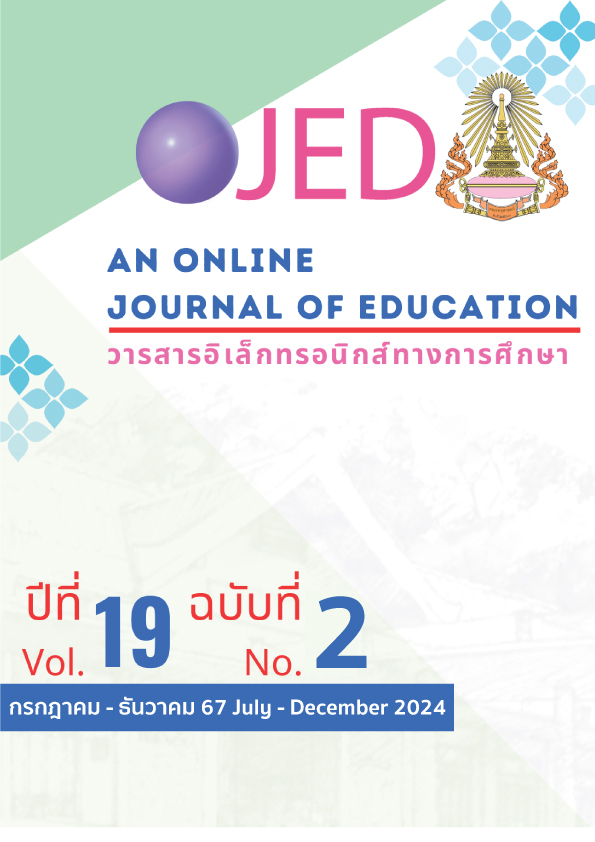Guidelines for Promoting Political Literacy among High School Students
DOI:
https://doi.org/10.14456/ojed.2024.8Keywords:
political literacy, Promotion Guidelines, High School StudentsAbstract
This research aimed to 1) study the key components and specific behavioral indicators of political literacy among high school students and 2) propose guidelines for promoting political literacy among high school students. The study employed a qualitative research method, including document synthesis, interviews, focus group discussions, and content analysis. The target participants were three groups of experts: political science, curriculum and teaching specialists, and social studies teachers. The research tools included interviews, indicator validation forms, focus group discussion records, and performance evaluation forms. Data were analyzed using content analysis. The research findings revealed that: 1) The key components of political literacy for high school students consisted of five main elements: political knowledge, political information literacy, self-awareness of political perspectives, tolerance for political differences, and political expression and participation. 2) The guidelines for promoting political literacy among high school students focused on (1) developing all five components holistically; (2) following the SECMAR principles; (3) utilizing the 6D Model; (4) emphasizing integrated learning into strategies and learning methods, experiential learning, and decision-making skill development; (5) dividing the promotion of political literacy into three level; (6) dividing the implementation models in schools into two types: integration into existing courses and promotion through extracurricular activities; and (7) integrating the key principles, including holistic evaluation, real-life practice-based assessment, and assessment of thinking and decision-making skills via scenario-based evaluations, into the assessment of political literacy.
References
ภาษาไทย
กิตติชัย ขันทอง. (2565). การปรับปรุงหลักสูตรการศึกษาที่ส่งเสริมความรู้ทางการเมืองในโรงเรียนไทย. วารสารการศึกษาและนวัตกรรม, 14(1), 77-90.
ณัฐฐินันท์ นันทะเสนา. (2563) แนวทางการเคลื่อนไหวทางสังคมโดยกลุ่มนักศึกษาขบวนการประชาธิปไตยใหม่. วารสารพัฒนาสังคม. 23(2), 52-71.
ธนธัช ชัยพรหม. (2558). การสอนวิธีคิดเชิงวิเคราะห์ในสถานการณ์จำลองทางการเมือง. วารสารการพัฒนาการศึกษา, 18(1), 91-104.
ธนพร นพรัตน์. (2565). การสะท้อนมุมมองทางการเมืองของนักศึกษาในประเทศไทย: การส่งเสริมความตระหนักรู้ในมุมมองทางการเมืองของนักเรียน. วารสารการศึกษาและการพัฒนา, 9(1), 45-67.
https://doi.org/10.1234/education.2022.00123
นริศรา จิตต์จรัส. (2566). การวิเคราะห์และประเมินข้อมูลข่าวสารทางการเมือง: ผลกระทบต่อการรู้เท่าทันข่าวสารทางการเมืองของนักเรียนระดับมัธยมศึกษา. วารสารวิจัยการศึกษา, 24(1), 75-90.
ประจักษ์ ก้องกีรติ. (2565, 4 กุมภาพันธ์). สู่โลกใบใหม่ ด้วยพลังแห่งวัยเยาว์. Amnesty International Thailand. https://www.amnesty.or.th/latest/blog/9861/
รัฐธรรมนูญแห่งราชอาณาจักรไทย พุทธศักราช 2560. (2560, 6 เมษายน). ราชกิจจานุเบกษา. เล่มที่ 134 ตอนที่ 40. หน้า 1-90.
รัตนะ บัวสนธ์. (2551). เทคนิคการวิเคราะห์ข้อมูลเชิงเนื้อหา. วารสารวิจัยการศึกษา, 4(1), 15-35.
วัลลภ รัฐฉัตรานนท์ และ รัตนาวดี ลำพาย. (2563). การมีส่วนร่วมทางการเมืองของเยาวชนไทย: มูลเหตุ รูปแบบ และผลที่เกิดขึ้นตามมา. วารสารรัฐศาสตร์ปริทรรศน์, 7(1), 1-18.
สำนักงานเลขาธิการสภาการศึกษา. (2563). การจัดการเรียนรู้ฐานสมรรถนะเชิงรุก. http://backoffice.onec.go.th/uploads/Book/1801-file.pdf
สำนักงานราชบัณฑิตยสภา. (2562). พจนานุกรมศัพท์ศึกษาศาสตร์ร่วมสมัย ชุดความฉลาดรู้ (Literacy) ฉบับราชบัณฑิตยสภา. สำนักพิมพ์อรุณการพิมพ์.
ภาษาอังกฤษ
Banks, J. A. (2009). Teaching strategies for ethnic studies (6th ed.). Allyn & Bacon.
Denzin, N. K., & Lincoln, Y. S. (2018). The SAGE handbook of qualitative research. Sage.
Finkel, S. E., & Ernst, H. R. (2005). Civic education in post-apartheid South Africa: Alternative paths to the development of political knowledge and democratic values. Political Psychology, 26(3), 333-354.
Fisher, A. (2010). Critical thinking: An introduction. Cambridge University Press.
Gordon, S. (2020). In-depth interview methods in social research: A guide for researchers. Qualitative Research Journal, 20(3), 215-228.
Hennink, M. M. (2007). International Focus Group Research: A Handbook for the Health and Social Sciences.Cambridge University Press.
Hess, D. J. (2009). Teaching students to be politically literate: The role of classroom discussion. Social Education, 73(3), 146-151.
Hoskins, B., & Crick, R. D. (2010). The development of political literacy: Levels of complexity and associated skills in civic education. Citizenship Studies, 14(3), 329-343.
Johnson, D. W. (1994). Cooperative learning: Methods and strategies for social science education. In M. L. de Vries (Ed.), Handbook of social studies education (pp. 203-214). Westport, CT: Greenwood Press.
Kahne, J., & Bowyer, B. (2017). Educating for civic engagement: The role of digital media in promoting critical media literacy. Theory and Research in Social Education, 45(2),
-235. https://doi.org/10.1080/00933104.2017.1281630
Kahne, J., & Middaugh, E. (2021). Participatory learning for citizenship development: Engaging students in meaningful civic education. Journal of Civic Education, 23(1), 45-62.
Kolb, D. A. (1984). Experiential Learning: Experience as the Source of Learning and Development. Prentice-Hall.
Kurth-Schai, R. (2006). Principles for holistic citizenship assessment: Moving beyond knowledge and skills to include behaviors and attitudes aligned with civic engagement. Journal of Civic Education, 14(2), 153-167.
Manning, K., & Edwards, R. (2014). Engaging students in political activities: Enhancing real-world political participation and civic skills development. Journal of Political Science Education, 10(1), 15-34.
https://doi.org/10.1080/15512169.2014.869697
Merrill, M. D. (2021). First Principles of Instruction: Designing Effective Instruction. Wiley.
Miller, D., & Dijk, T. (2021). The role of developing tolerance in listening to differing opinions
in fostering understanding and resolving political conflicts. Journal of Political Psychology, 42(3), 405-420. https://doi.org/10.1111/pops.12689
Paul, R., & Elder, L. (2002). Critical thinking: Tools for taking charge of your professional and personal life. Financial Times Prentice Hall.
Putnam, R. D. (2021). The importance of political participation and expression in strengthening local and national politics and society. American Political Science Review, 115(1), 1-15.
https://doi.org/10.1017/S000305542000012X
Westheimer, J., & Kahne, J. (2004). What kind of citizen? The politics of educating for a democratic society. American Educational Research Journal, 41(2), 237-269
Downloads
Published
How to Cite
Issue
Section
License
Copyright (c) 2024 An Online Journal of Education

This work is licensed under a Creative Commons Attribution-NonCommercial-NoDerivatives 4.0 International License.




